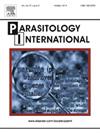ELISA based seroprevalence and risk factors for three zoonotic parasites (Toxoplasma gondii, Echinococcus granulosus and Trichinella spiralis) in humans in Khyber Pakhtunkhwa, Pakistan
IF 1.5
4区 医学
Q3 PARASITOLOGY
引用次数: 0
Abstract
Zoonotic parasitic infections can affect both animal and human health, while also having food safety and economic implications. These pathogens can also pose occupational risks for certain groups, including veterinary professionals, animal handlers, and butchers. This study was conducted in the district of Swabi located in the Khyber Pakhtunkhwa Province of northwestern Pakistan. Serum samples from 187 males 15 years of age and older representing four different exposure groups were tested for the presence of specific antibodies to Toxoplasma gondii, Echinococcus granulosus, and Trichinella spiralis antigen using an enzyme-linked immunosorbent assay (ELISA). The exposure groups were no current animal ownership, livestock ownership, dogs and/or cats in the household, and the occupation groups butchers, and veterinarians or para-veterinarians. Seropositivity for each parasite was evaluated by subgroup. Fisher's exact test was used to evaluate possible associations between seropositivity, and potential categorical variables obtained through administration of a questionnaire. Anti-Toxoplasma antibodies were detected in 55 (29.4 %) of the 187 samples. In addition, 26.8 % (47/175) of individuals with available samples had antibodies to E. granulosus, and a single (0.5 %; 1/187) individual had antibodies to T. spiralis. One individual was seropositive for all three parasites and 9 individuals were seropositive for two parasites. The only significant factor was that Echinococcus seropositivity was associated with age group (p = 0.023) among butchers. The knowledge obtained through this study will be informative for the implementation of prevention and control strategies against these parasites at a local scale.

巴基斯坦开伯尔-普赫图赫瓦省3种人畜共患寄生虫(刚地弓形虫、细粒棘球绦虫和旋毛虫)的ELISA血清阳性率和危险因素分析
人畜共患寄生虫感染可影响动物和人类健康,同时也具有食品安全和经济影响。这些病原体还可能对某些群体构成职业风险,包括兽医专业人员、动物处理者和屠夫。这项研究是在位于巴基斯坦西北部开伯尔-普赫图赫瓦省的斯瓦比地区进行的。采用酶联免疫吸附试验(ELISA)对187名年龄在15 岁及以上、代表4个不同暴露组的男性血清样本进行了检测,以检测弓形虫、细粒棘球绦虫和旋毛虫抗原特异性抗体的存在。暴露组为目前没有动物拥有权、没有牲畜拥有权、家庭中没有狗和/或猫,职业组为屠夫、兽医或准兽医。按亚组评估每种寄生虫的血清阳性情况。使用Fisher精确检验来评估血清阳性与通过问卷调查获得的潜在分类变量之间可能存在的关联。187份标本中检出弓形虫抗体55份(29.4 %)。此外,26.8 %(47/175)的个体有颗粒棘球蚴抗体,单个(0.5 %;1/187)个体有螺旋体抗体。1例3种寄生虫血清均呈阳性,9例2种寄生虫血清均呈阳性。肉贩棘球蚴血清阳性与年龄相关(p = 0.023)。通过本研究获得的知识将为在地方范围内实施这些寄生虫的预防和控制战略提供信息。
本文章由计算机程序翻译,如有差异,请以英文原文为准。
求助全文
约1分钟内获得全文
求助全文
来源期刊

Parasitology International
医学-寄生虫学
CiteScore
4.00
自引率
10.50%
发文量
140
审稿时长
61 days
期刊介绍:
Parasitology International provides a medium for rapid, carefully reviewed publications in the field of human and animal parasitology. Original papers, rapid communications, and original case reports from all geographical areas and covering all parasitological disciplines, including structure, immunology, cell biology, biochemistry, molecular biology, and systematics, may be submitted. Reviews on recent developments are invited regularly, but suggestions in this respect are welcome. Letters to the Editor commenting on any aspect of the Journal are also welcome.
 求助内容:
求助内容: 应助结果提醒方式:
应助结果提醒方式:


